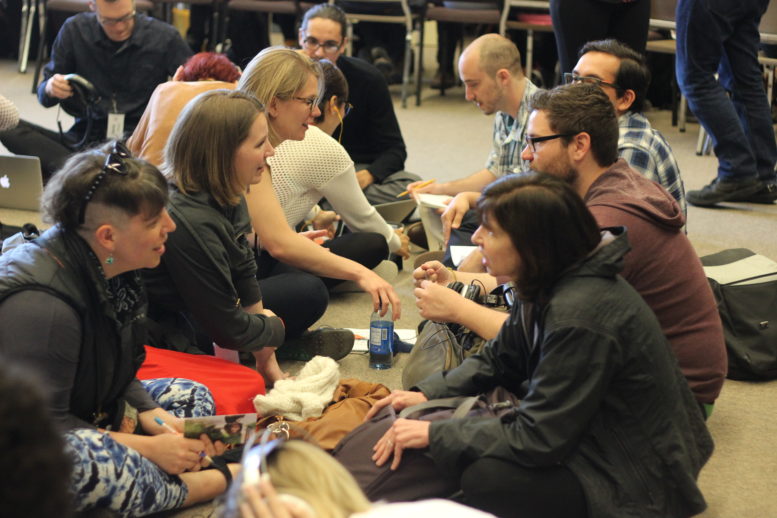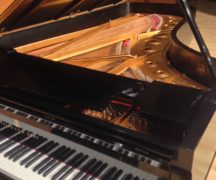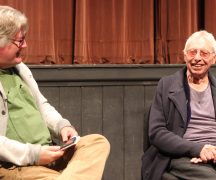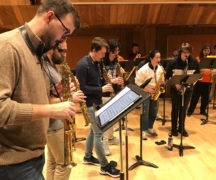By DAVID DUPONT
BG Independent News
Kelly Rehearsal Hall was alive with 100 conversations Friday noontime.
In two concentric circles composers sat on the outside and performers, producers and presenters on the inside. Each pair locked in conversation, often those inside with headphones had clamped on their ears. Those outside brandishied laptops, or scores.
And then at four minute intervals a gong would sound, and those on the inside would shift down to their left.
This is New Music Speed Dating, and this the New Music Gathering.
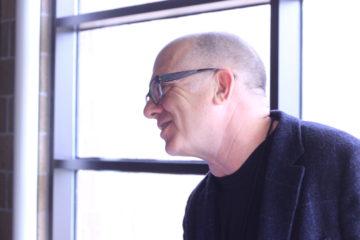
Featured artist percussionist Steven Schick speaks with audience member after his keynote address.
The three-day gathering began in Bowling Green State University’s Moore Musical Arts Center the morning of Thursday and will continue until the early morning hours of Sunday (For schedule of events including concerts Friday featuring featured artist percussionist Steven Schick and Saturday at 8 p.m. visit: http://www.newmusicgathering.org/schedule-of-events.html.) Attendees will discuss innovative techniques, musical philosophy, funding, and ways to reach new audiences. About 400 people contemporary music devotees are expected to attend.
New Music Speed Dating embodies the spirit of the event, whimsical and a bit theatrical in its construct, yet practical.
The event is a signature feature of the Gatherings. This is the third. The first was in San Francisco Conservatory and the second at Peabody Conservatory Baltimore. Coming to Bowling Green, said Danny Felsenfeld, one of the founders, was natural.
“This is the first time we went to a school that’s known for being a center of new music,” he said. “That’s why you come to Bowling Green to learn to compose and perform new music.”
The vision for the gathering was for something “simple, stripped down, and inexpensive,” Felsenfeld said.
The speed dating addresses members of the new music communities need to reach out and make connections. It’s “a distilled, quintessential version” of that process he said. “The chaos is part of the charm. They’re having strangely intimate conversations in a very noisy room.”
Brianna Buck, a saxophonist who is heading into her senior year at BGSU, exited the room clutching 10 business cards. She found encountering so many people while still on the brink of her career exciting.
Chris Dietz, who teaches composition at the university, said he was fascinated by “how people consume information in a very short period of time.”
He came prepared to make his pitch with a two-minute video montage of a half-dozen of his pieces on a laptop and noise canceling headphones. They were a mixed bag, including people just finishing their doctoral programs and others who ran record labels About half those he encountered were people he’d not ordinarily see. A few were his former students.
Nick Zoulek, a BGSU doctoral candidate on leave to teach at the University of Wisconsin-Whitewater, said he found possibilities in all the people he met during the speed dating as well as the others he met after the event was over and people lingered inside Kelly Hall.
He said that coming in he expected the gathering would be another conference. “Just immediately walking in the door you see the warm inviting environment,” Zoulek said. “It’s a community. It’s really nice to feel that support from everyone who is gunning for the same thing, making music that’s relevant and expressive today.”
In his key note address percussionist Steven Schick spoke of the importance of having an “externally facing artistic practice.”
He contrasted that with “the default mode of much academic training” that focuses on being the most skilled musician possible.
Instead “the goal of an externally facing practice is to become as complete a human being as possible, in whose life music plays a central and defining role.”
For him that includes maintaining a connection to nature. Not that every composer needs to write music inspired by nature.
Sometimes it’s best just to let the “noise” of the world be just that without being refined into art.
Schick said 11 years ago, he set off to walk from San Diego to San Francisco, about 700 miles. He planned to write a book, a 21st century extension of the work of composer and philosopher John Cage.
He finished the walk, but not the book. He found his stories were interesting, but his theories were not.
About 200 miles in at Zuma Beach, he realized he was really walking to San Francisco because his girlfriend, Brenda, lived there and he was going to propose.
“As a result I spent the remaining 500 miles in a state of constant delight, not in chin-scratching inquiry,” he said “It’s a far better way to start a marriage.”
Being externally focused means also being in tune with the times. “This historical moment has electrified many of us in ways not seen since 1968.”
He conducts the La Jolla Symphony, and at a recent performance of Debussy’s “La Mer,” they asked the audience not just to imagine the sound of the sea but to think of it as a harbinger of advancing climate change and a passage to another life.
“We maintained that a great performance of ‘La Mer’ is not possible without imagining overcrowded dinghies foundering in the Mediterranean, without hearing the cries of refugees as they sink by the thousands beneath the waves, responding to what is, in essence, the world’s most severe humanitarian crisis of the past half-century.”
Music in America, 2017, is about hearing voices whether they are fearful sounds from synagogues concerned about the rise of anti-Semitism or from immigrants now living in fear and uncertainty. Or people afraid of being attacked simply for “walking down the street in the skin color God gave them.”
Schick said: “Making music today must be about nothing less than asserting moral force. It must be about how we—we who have so much and who live so fully—can act responsibly in a world where so many have so little. It must be about the voices too faint to hear.”
Schick, 63, said he saw reason to hope in those gathered at BGSU this week, most of whom appeared to be in their 20s and 30s.
“You are dreamers; you are thinkers; you are dry kindling ready to burst into flame,” he said. “But most importantly you are musicians, born of noise, rooted to the earth and connected to other people. “
The New Music Gathering is just the place to strengthen those connections.

